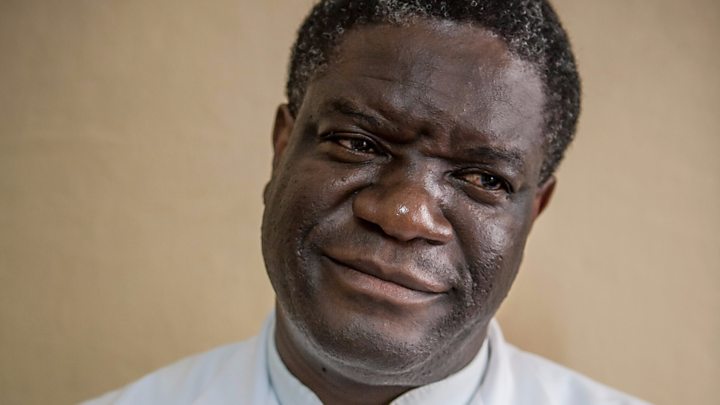In what has been called the “rape capital of the world” by a top UN official, Dr. Denis Mukwege offers hope to women whose attacks destroyed their bodies and now their lives. Before filling a desperate need and specializing in rape trauma surgery, Dr. Mukwege aspired to help women of the Democratic Republic of Congo (DRC) by providing better maternity care. In the DRC, one percent of women die during childbirth (to put it in perspective that is 1 for every 100 which makes Congolese women 8 more times likely to dye than in “developed countries,” where the number is on average of 12 in every 100,000).1 However, shortly after he founded the Panzi Hospital in 1999, Dr. Mukwege’s life took an entirely different course when his first patient was admitted. Instead of looking to have a baby, she sought treatment after suffering a rape where the assailants, from one of the many military groups in the DRC, had shot her in the genitals.2 Shortly after this event, the hospital cared for forty-eight baby girls, all raped by a local mans army, one of the tens of military, paramilitary, rebels, and foreign militant groups who use terror to displace locals and refugees in an attempt to secure natural resources.3 Luckily, these particular rapes stopped after the hospital and other human rights groups convinced a military court to prosecute the case.

Though Dr. Mukwege did not realize it at the time, founding his hospital in Eastern Congo would help him “become the world’s leading specialist in the treatment of wartime sexual violence and a global campaigner against the use of rape as a weapon of war.”4 Caring for more than 3,500 women per year, and sometimes up to 10 women a day, Dr. Mukwege, as well as 370 doctors, nurses and support staff, do more than simply repair women physically, they also work to improve their lives in many meaningful ways.5 They follow a five-pillar method. The hospital works with each woman to provide physical medical treatment, psycho-social therapy, socioeconomic support and training, community reintegration and, finally, legal assistance in done in the order listed. A senior advisor to Dr. Mukwege, Elizabeth Blackney, describes this program as:
“Once [women] get through [their] psycho social and medical healing, [they] move on and work with our socioeconomic pillar [to] learn literacy and numeracy and education. [Women] have a safe space to learn vocational skills. And then we of course provide legal aid and assistance to help people get justice.”6
This work is not done without risk, however, and, in 2012, shortly after giving a speech at the United Nations in which he called for an end to the corruption within the government of the DRC, and stated not enough was being done to stop “an unjust war that has used violence against women and rape as a strategy of war,” five armed men stormed the Mukwege family compound in an attempt to assassinate Dr. Mukwege, his wife, and two daughters.7 While Dr. Mukwege and his family survived, his trusted friend and bodyguard, Joseph Bizimana, died protecting the family.8

Though he fled to Belgium, he returned to the DRC not long afterwards, when women of the DRC sold their harvests and raised money to buy Dr. Mukwege and his family plane tickets back. When asked about his return, Dr. Mukwege told the British Broadcasting Network that “[a]fter that gesture, I couldn’t really say no. And also, I am myself determined to help fight these atrocities, this violence. My life has had to change, since returning. I now live at the hospital and I take a number of security precautions, so I have lost some of my freedom.”9 Despite the danger to his own life, Dr. Mukwege continues to transform the lives of many Congolese women in powerful, positive, and lasting ways. He is the light for thousands of women and continues to champion for the protection of women from current and future horrors that are the hallmarks of the conflict in the DRC since the mid 1990s. Proof of his incredible impacts is a woman named Sarah. Her attackers, after slaughtering her village, tied her to a tree where she was brutally raped by different men for days. When she arrived at the hospital, she was in critical condition, unable to even stand on her own. But, as each day passed, her will to live became stronger, and “[t]oday, Sarah is a beautiful, smiling, strong and charming woman…[who] runs her own business…bought a plot of land…has built a little house [and] is independent and proud.”10 For these efforts and all of his contributions, in October of 2018, he was announced as the co-recipient to the Nobel Peace Prize with Nadia Murad “for their efforts to end the use of sexual violence as a weapon of war and armed conflict.”11
- Jackson Sinnenberg, “‘Dr. Miracle’ Is The Co-Recipient Of The Nobel Peace Prize,” NPR, October 05, 2018, Accessed December 06, 2018, https://www.npr.org/sections/goatsandsoda/2018/10/05/654699946/dr-miracle-is-the-co-recipient-of-the-nobel-peace-prize; “Maternal Mortality,” World Health Organization, February 16, 2018, Accessed December 06, 2018, https://www.who.int/news-room/fact-sheets/detail/maternal-mortality. ↵
- Jackson Sinnenberg, “‘Dr. Miracle’ Is The Co-Recipient Of The Nobel Peace Prize,” NPR, October 05, 2018, Accessed December 06, 2018, https://www.npr.org/sections/goatsandsoda/2018/10/05/654699946/dr-miracle-is-the-co-recipient-of-the-nobel-peace-prize; Dr. Denis Mukwege, “The Nobel Peace Prize 2018,” NobelPrize.org, Accessed April 07, 2019, https://www.nobelprize.org/prizes/peace/2018/mukwege/55721-denis-mukwege-nobel-lecture-2/. ↵
- Mewiga Baregu, “Congo in the Great Lakes Conflict,” In Security Dynamics in Africa’s Great Lake Region, edited by Gilbert M. Khadiagala, 59-79. (Boulder: Lynne Rienner Publishers, Inc., 2006); Dr. Denis Mukwege, “The Nobel Peace Prize 2018,” NobelPrize.org, Accessed April 07, 2019, https://www.nobelprize.org/prizes/peace/2018/mukwege/55721-denis-mukwege-nobel-lecture-2/. ↵
- “Dr Denis Mukwege,” Dr. Denis Mukwege Foundation, Accessed December 06, 2018, https://www.mukwegefoundation.org/story/dr-denis-mukwege/. ↵
- “Nobel Peace Prize Winner: Denis Mukwege from DR Congo,” BBC News, October 05, 2018, Accessed December 06, 2018, https://www.bbc.com/news/world-africa-45759304. ↵
- Sinnenberg, Jackson, “‘Dr. Miracle’ Is The Co-Recipient Of The Nobel Peace Prize,” NPR, October 05, 2018, Accessed December 06, 2018, https://www.npr.org/sections/goatsandsoda/2018/10/05/654699946/dr-miracle-is-the-co-recipient-of-the-nobel-peace-prize. ↵
- “Dr Denis Mukwege,” Dr. Denis Mukwege Foundation, Accessed December 06, 2018, https://www.mukwegefoundation.org/story/dr-denis-mukwege/. ↵
- “Nobel Peace Prize Winner: Denis Mukwege from DR Congo,” BBC News, October 05, 2018, Accessed December 06, 2018, https://www.bbc.com/news/world-africa-45759304. ↵
- Sinnenberg, Jackson, “‘Dr. Miracle’ Is The Co-Recipient Of The Nobel Peace Prize,” NPR, October 05, 2018, Accessed December 06, 2018, https://www.npr.org/sections/goatsandsoda/2018/10/05/654699946/dr-miracle-is-the-co-recipient-of-the-nobel-peace-prize. ↵
- Dr. Denis Mukwege, “The Nobel Peace Prize 2018,” NobelPrize.org, Accessed April 07, 2019, https://www.nobelprize.org/prizes/peace/2018/mukwege/55721-denis-mukwege-nobel-lecture-2/. ↵
- “The Nobel Peace Prize” 2018, NobelPrize.org, Nobel Media AB 2019, (Accessed 7 Apr 2019), <https://www.nobelprize.org/prizes/peace/2018/summary/>. ↵



56 comments
Nursultan Berdaliyev
This is the first time I read about this man, and after reading about Dr.Mukwege, my faith in humanity has increased. A wonderful man who sacrifices himself to preserve the physical and mental health of women who are victims of violence. I really liked the fact that after treatment, he and his team do not leave these women, but help them in legal matters and social issues, because, after the experience, it is very difficult to return to a normal lifestyle. Great job!
Madison Coy
The work of Dr. Mukwege from DRC is a clear indication of the sexual violence that is still being experienced in Africa. After reading the article, I felt that serving the unfortunate members of society was good since they go through many problems that affect their self-esteem and physical health. Rape victims tend to have less help from well-wishers considering that most of the affected persons fail to report or even seek help in the first place.
Maya Gallegos
I think that this article can be connected to Women, Peace, and Security (WPS) efforts as women are often disproportionately affected by armed conflict. Unfortunately, this phenomenon is not localized, and affects women outside of the African continent as well. I think that Dr. Mukwege’s efforts are vital to recognizing the impact armed conflicts have on women as well as for advocating for victims.
Joshua Hall
I am familiar with the DRC because of its colonial history with Belgium. The stark reality that roughly 1/100 women die in childbirth is horrifying. Historically rape was an accepted practice of victorious armies seeking treasure and plunder. Dr. Mukwege’s practice and treatment facility have changed the landscape of the DRC. Specifically with hygiene and education of women. Many countries limit their economic potential by not allowing women to contribute outside of traditional roles. His actions will be a force-multiplier going forward for the DRC. Economic security is vital if you want investment particularly from the West. His actions in years to come will dramatically change the central African landscape.
Very succinct in his study of Dr. Mukwege. I think the point of the article is to make you want more. Which he succeeded in. My only frustration is I want more info on this angel from the DRC.
Aaron Sandoval
I found this article very touching, I am amazed by the efforts and the difference made by Dr. Denise Mukwege, especially his willingness to help provide medical and economic help to the women of the Democratic Republic of Congo. His campaign against rape as a weapon of war, despite the risk of assassination, is incredibly honorable. This article is incredibly informative and worth the read.
Caily Torres
Dr. Mukwege is a true hero. I heard of this story a while back and this article had me completely captivated. Women could not speak up about rape in the DRC as they were terrified and rightfully so, but they found help and hope with Mukwege. He helped them recover physically, mentally, and emotionally. He was a safe place for women and children who were victims of such a horrific crime and he helped them get back on their feet and find their voice. It is so sad that he was forced to leave behind his creation because the DRC did not “approve” of his work. Dr. Mukwege is a hero and I will forever be grateful for his effort and the impact he had.
Yamel Herrera
This article does a great job of depicting the bravery and passion that Dr. Mukwege exemplified in founding the Panzi Hospital. The reality of using rape as a military weapon is terrifying, especially if no one makes it their goal to do something about it. Dr. Mukwege’s motivation to continue providing wholistic services even after having his life threatened speaks to his character and justifies his deserving of the Nobel Peace Prize. I believe this article could benefit from also including whether or not other medical experts were motivated to also provide their expertises to campaign against the use of sexual assault as a military weapon in the DRC.
Genesis Vera
Personally, I feel a little guilty and uninformed that I had no idea who Dr. Mukwege was. I am glad I know who he is now because he has clearly had a great impact in the Democratic Republic of Congo. I thought it was a good idea to not only include what he has done or gone through but also add some of the rape survivors’ stories. It made me realize how dire the situation is in the Democratic Republic of Congo.
Alexandria Garcia
Dr.Miracle was truly selfless in his efforts to help these victims. It seems like he not only helped these women recover from traumatic experiences, but he also helped them gain their confidence back to do more than just recover but to create as well. I think this article is amazing in quickly giving a great description of the obstacles that the Doctor faced that were overcome by his passion and the passion of others.
Ana Cravioto Herrero
What a touching article! I had never heard about Dr. Denis Mukwege and I feel like he should be someone everyone looks up to. I love his cause and it is amazing how he spread his message and helped woman within the Democratic Republic of Congo. Rape is such an awful and real problem that many people avoid talking about, but it is important that people, no matter of what gender.